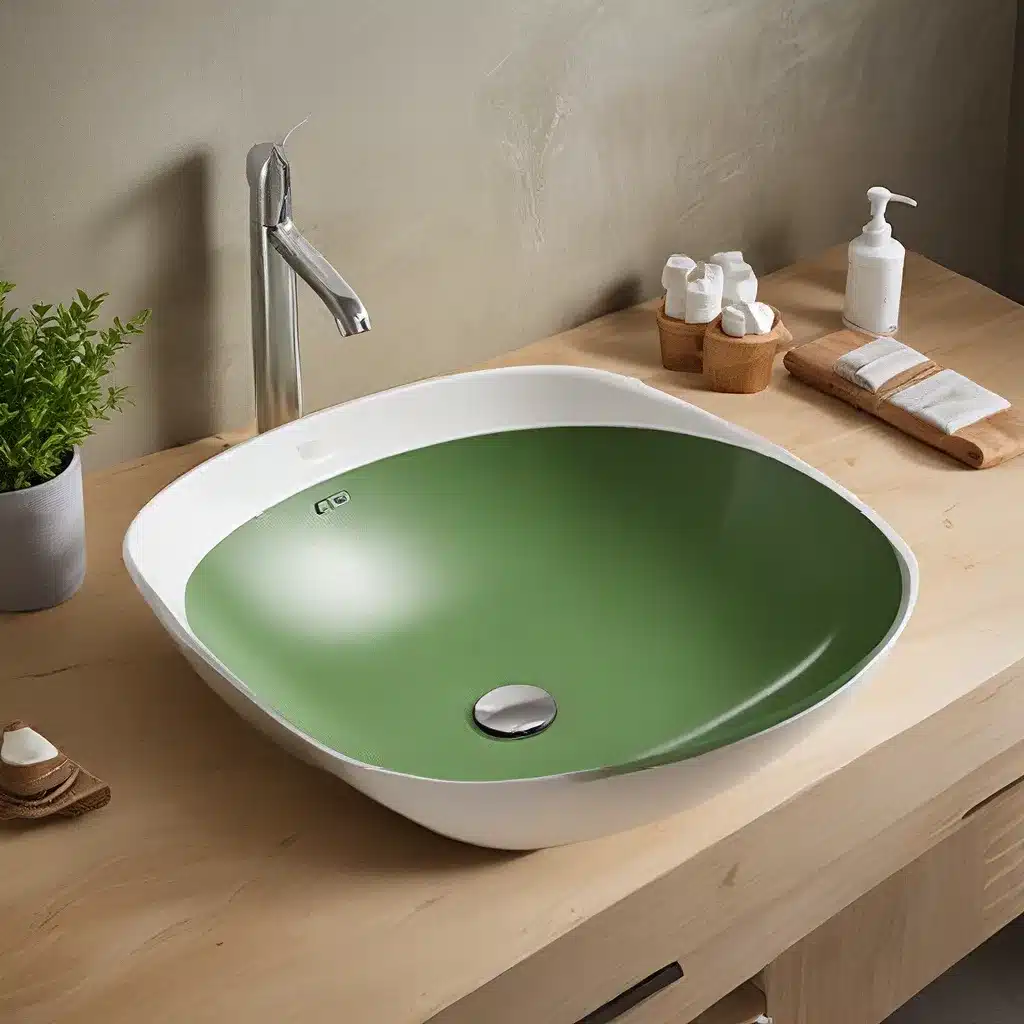
In a world where environmental consciousness is paramount, homeowners, designers, and contractors alike are seeking ways to create bathrooms that not only look stunning but also leave a lighter footprint on the planet. At the heart of this eco-friendly revolution are washbasins – the centerpiece of any bathroom – and the materials used to craft them.
Exploring Sustainable Washbasin Materials
When it comes to building an eco-conscious bathroom, the choice of washbasin materials is crucial. Homeowners and designers are increasingly gravitating towards sustainable options that not only reduce environmental impact but also offer long-lasting performance and timeless aesthetics.
Natural Stone: A Timeless Elegance
Natural stone, such as marble, granite, and soapstone, has long been a popular choice for washbasins due to its unparalleled beauty and durability. These materials are quarried from the earth, making them inherently sustainable and environmentally friendly. Marble, for instance, is a metamorphic rock formed over millions of years, imbued with unique veining patterns that add character and charm to any bathroom.
Aquatica USA highlights the benefits of natural stone, noting that it is a “renewable resource and can be recycled at the end of its useful life, making it a sustainable choice for bathroom fixtures.”
Reclaimed Wood: A Rustic Charm
For those seeking a more rustic and vintage-inspired look, reclaimed wood washbasins offer a captivating alternative. These basins are crafted from salvaged and repurposed wood, often sourced from old barns, factories, or even shipwrecks, giving each piece a unique story and character.
Jacuzzi Bath Remodel emphasizes the environmental benefits of reclaimed wood, stating that it “reduces the need for new timber, minimizing deforestation and preserving natural habitats.” Additionally, the use of reclaimed materials aligns with the principles of circular economy, where waste is minimized, and resources are reused.
Ceramic and Porcelain: Timeless Elegance
Ceramic and porcelain washbasins have long been a staple in the bathroom design world, and for good reason. These materials are durable, easy to clean, and resistant to stains and scratches, making them a practical choice for both residential and commercial settings.
Moreover, many manufacturers are now incorporating sustainable practices into their ceramic and porcelain production processes, such as using recycled materials and reducing energy consumption. This shift towards eco-friendly manufacturing aligns with the growing demand for green bathroom solutions.
Bamboo: A Renewable Wonder
Bamboo is another renewable and eco-friendly material that has gained popularity in the world of washbasin design. This fast-growing grass is a sustainable alternative to traditional wood, and its natural beauty and unique grain patterns can add a touch of warmth and sophistication to any bathroom.
Sustainable interior designer Chawla shares her experience using bamboo in a corporate office project, highlighting its “versatility and beauty” in creating a harmonious, nature-inspired space.
Designing for Sustainability: Washbasin Installation and Maintenance
Eco-conscious bathroom design extends beyond just the choice of materials; it also encompasses the installation and maintenance of washbasins to ensure long-term sustainability.
Water-Efficient Faucets and Fixtures
One of the key aspects of sustainable bathroom design is the selection of water-efficient faucets and fixtures. These innovative products are designed to reduce water consumption without compromising performance or user experience.
Jacuzzi Bath Remodel emphasizes the importance of “water-saving bathroom upgrades, including efficient showerheads and faucets,” as a crucial step in achieving an eco-friendly bathroom renovation.
Durable and Low-Maintenance Materials
When it comes to long-term sustainability, the durability and low-maintenance requirements of washbasin materials play a vital role. Materials like acrylic, stainless steel, and certain types of natural stone are known for their exceptional resistance to stains, scratches, and wear and tear, ensuring that your bathroom remains beautiful and functional for years to come.
Jacuzzi Bath Remodel highlights the benefits of their acrylic bathtubs, which “retain heat for extended periods and allow you to enjoy a prolonged comfortable bathing experience while actively saving energy and water.”
Seamless Integration with Smart Home Technology
The integration of smart home technology in bathrooms can further enhance the sustainability of your washbasin system. Features like leak detection sensors, water usage monitoring, and remote control capabilities can help homeowners track and optimize water consumption, ensuring that every drop is used efficiently.
Sustainable interior designer Chawla emphasizes the importance of “energy-efficient solutions and smart home technology” in creating eco-conscious bathroom spaces.
Embracing the Future of Sustainable Bathrooms
As the demand for eco-friendly bathroom solutions continues to grow, the washbasin has emerged as a crucial component in the pursuit of sustainability. By embracing green materials, water-efficient fixtures, and smart home technology, homeowners, designers, and contractors can create bathrooms that not only look stunning but also contribute to the preservation of our planet.
At Washbasin Factory, we are committed to providing our customers with a wide range of sustainable and innovative washbasin options, empowering them to design bathrooms that are both environmentally conscious and visually captivating. From natural stone to reclaimed wood, our carefully curated selection offers the perfect balance of style and sustainability, ensuring that your dream bathroom becomes a reality without compromising the well-being of our shared environment.